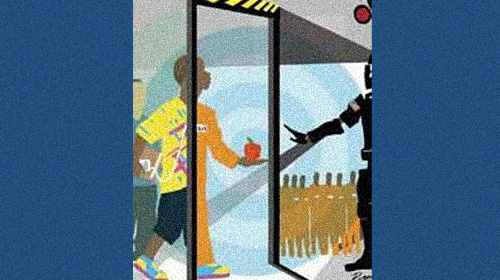
Every parent should be able to send their child off to school knowing that he or she will spend the day in a safe environment. For many parents across the nation, however, that peace of mind was shattered by the unthinkable tragedy that took place at Sandy Hook Elementary School in December. Today, the House of Representatives will take up the issue of school safety with a in the House Education and Workforce Committee. The ACLU has submitted a statement suggesting ways to ensure that schools are safe places for students to learn, grow, and thrive.
There is no question that school safety is a significant issue that needs to be effectively addressed. However, the ACLU is concerned that many of the solutions being proposed across the country involve increasing police presence in schools. Sadly, we have been down this road before, and history has proven that this approach is not only when it comes to preventing violence, but can actually harm kids in ways that lawmakers didn’t contemplate—by pushing them into the school to prison pipeline. When more police or Safety Resource Officers (SROs), are stationed in schools, they assume a disciplinary role that was once reserved for school administrators and teachers. As a result, students face criminal repercussions for minor misbehavior like playground fights or talking out of turn in class. For example, in New York City, which employs a school security force of over 5,000, 77% of incidents that the police were involved in during the 2004-2005 school year were classified as “non-criminal.” By putting these kids in contact with the criminal justice system at even younger ages, schools are sending them down a path that is often difficult to reverse. Moreover, a nationwide showed that SROs generally did not receive appropriate training before their placement in schools, making their increased involvement in school discipline even more worrisome.
Rather than resorting to the same failed approach—putting more police in schools—it is time to seek real reform that makes schools safe, welcoming, nurturing environments for all students. At the federal level, Congress can support legislation to proactively improve learning opportunities and school climate, such as the Positive Behavior for Safe and Effective Schools Act. This bill would provide schools with the resources to implement positive behavior support systems – evidence—based practices demonstrated to reduce overly punitive disciplinary practices like suspensions and expulsions. Just recently, an organization committed to the well-being of our nation’s children—the —voiced its opposition to these overly punitive discipline policies that remove children from the learning environment.
Many school districts are already realizing that increasing the presence of law enforcement in schools is not the answer. , Colorado, which sharply increased police presence in its schools following the Columbine massacre, has been limiting the role of law enforcement in its schools for the past two years, and as a result, has cut suspensions in half and expulsions by two-thirds. More than a decade later, Denver schools have found that turning schools into fortresses by increasing police presence is not the way to make our children safer. The price of the unintended consequences of putting police in schools has been too high, and has negatively affected our students. Our nation’s parents, students, and teachers need new ideas to curb violence while continuing to nurture students, and not turn their schools into police-run entities, if we are to truly move forward.
The school to prison pipeline is one of the many civil liberties issues implicated by the tragedy at Newtown. To learn more about the ACLU’s broader concerns, including First Amendment rights, privacy, or the rights of individuals with mental health issues, please read this blog post from last week.
Learn more about school-to-prison-pipeline and other civil liberty issues: Sign up for breaking news alerts, , and .


